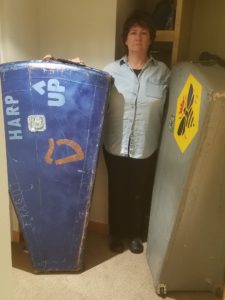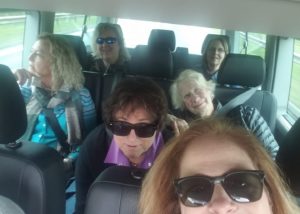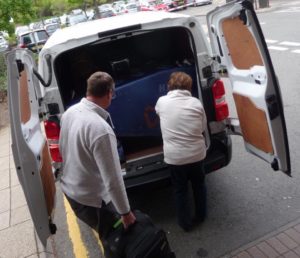I was driving down the highway the other day. I was going about 1000 miles, so on one
particularly long, straight stretch, I started remembering when I learned to
drive.
For me, one of the hardest things
to learn was staying in the middle of the lane.
When you start to drive, you know you need to stay in the lane – and between
the lines. The lane is defined by the
lines, so I looked at the lines - constantly. But you know how that goes – the more you
look at the lines, the farther you are from your desired position – in the
middle of the lane. The best advice (or
training) I got was to look down the road – look way down the road. After I (finally) learned that, staying in the lane was
so easy. Now, as an experienced driver, I
don't even see the lines close to me and keeping the vehicle in the middle of the lane is something I take for granted. It seems that I
just go where I meant to be.
The reality is, no
matter how good a driver you are, you will never stay in your lane to get where
you’re going if you don’t look ahead. So, what does that have to do with playing the harp? Everything!
When you’re learning a new tune – what do you do? I don’t know about you, but when I’m having
trouble getting a tune into my head, I naturally narrow my thinking down to
just what comes next - what’s the next note.
But this doesn’t actually help me learn the tune. It just frustrates me (thus drawing my focus
away from what I’m trying to do – learn the tune). If I lift my head and keep my focus “down the
road”, then I can think of the phrases (as phrases, not as a trickle of
sounds). When I can hear the tune in my
head, the notes that come next become so much easier to remember.
When you’re reading music, the notation (the lines and everything else) are
helpful – but can be distracting. Again,
sometimes just having all that ink only serves to draw your attention to the individual
blops – and you lose track of where you are on the page, in the phrase, in the
music. When you lose your place, your hands may not
end up in the right place, or they might be going the wrong direction or
be overstretched! Keeping the long view
will allow you to read the music rather than focusing on the ink and better allow
you to be more able to play.
When you’re playing, you have learned the tune or become
familiar with the dots on the sheet. When
you’re playing, you want to be “in the moment” – and that is important. But remember that music isn’t static or fixed. Music is serial, it comes out over time - like the road! It can’t come out all at once (although there are some composers who
clearly do not agree with me on that!).
So being in the moment has to include the plans for this moment, and then for
the next moment, and then the following moment, and on and on until the end of
the piece - as a flow. This is not contradictory, rather,
you need to hold the music in your head as a piece rather than as a set of
notes. Looking at the whole of the music,
rather than on just it’s representation (that you learned or are reading), will
help keep you on track.
When you’re performing, you really are taking all that you
have learned and putting it out there in the world to share. This is more than just playing in that now. Because now, in addition to being in the moment
with the music, you must also be present with the listeners. Whether there are 2 or 200 or 2000 in the
audience, your focus has to be “farther down the road” to include not only the
music but also the hearers and what your message to them/with them is. Here, your long view includes them, the
music, and the presentation. Keeping
an eye on where you want to take them with the music, what it is you want to
share, and how you mean to do that will help give you a smooth ride.
Of course, this is a simple analogy. There are many things on the road
that require attention (like stop signs, traffic, pedestrians, etc.).
And just like that, music (written or aural, practice or performance) has
details (like dynamics, tempo, timbre, etc.) which enrich the ride and
improve the experience. But, just as staying between the lines becomes second nature, learning,
reading, playing and performing can also become second nature so that your
music grows, flourishes, and delights.
And just like any journey, when staying between the lines comes naturally and effortlessly, you can enjoy the journey so much more easily. What are the lines you have a hard time not
looking at? How do you stay in the lane?
When you look down the road – what do you see?
Leave me a comment and share how you do it!
Blogspotters
- I am gradually moving the blog over to my website - please go over there,
subscribe (on the upper left of the screen) so you don't miss anything.
Unfortunately, blogspot doesn't have all the functionality available on the
website, so this site will eventually go away. Until then, I'll post the same
content but please begin to watch that space!












